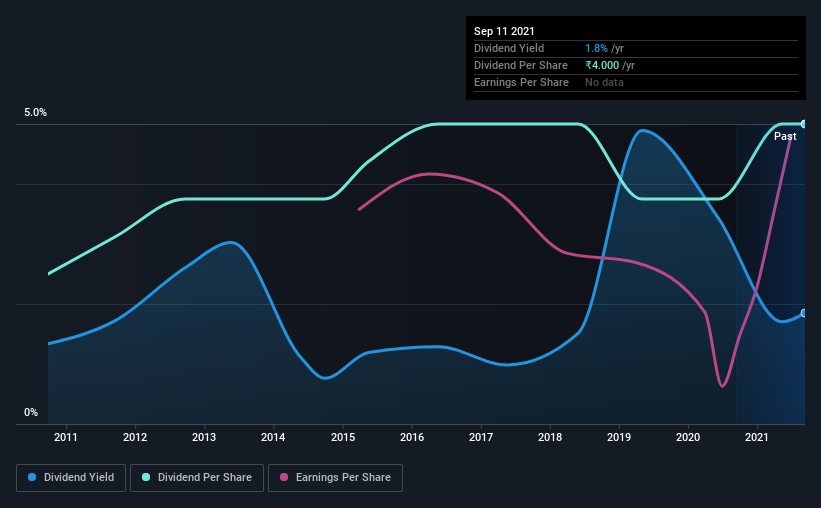HSIL (NSE:HSIL) Will Pay A Larger Dividend Than Last Year At ₹4.00
The board of HSIL Limited (NSE:HSIL) has announced that it will be increasing its dividend on the 29th of September to ₹4.00. This takes the dividend yield to 1.8%, which shareholders will be pleased with.
View our latest analysis for HSIL
HSIL's Dividend Is Well Covered By Earnings
While it is great to have a strong dividend yield, we should also consider whether the payment is sustainable. Before making this announcement, HSIL was easily earning enough to cover the dividend. This means that most of what the business earns is being used to help it grow.
Over the next year, EPS could expand by 2.9% if recent trends continue. If the dividend continues on this path, the payout ratio could be 22% by next year, which we think can be pretty sustainable going forward.

Dividend Volatility
The company's dividend history has been marked by instability, with at least 1 cut in the last 10 years. Since 2011, the first annual payment was ₹2.00, compared to the most recent full-year payment of ₹4.00. This works out to be a compound annual growth rate (CAGR) of approximately 7.2% a year over that time. A reasonable rate of dividend growth is good to see, but we're wary that the dividend history is not as solid as we'd like, having been cut at least once.
HSIL May Find It Hard To Grow The Dividend
With a relatively unstable dividend, it's even more important to evaluate if earnings per share is growing, which could point to a growing dividend in the future. Earnings per share has been crawling upwards at 2.9% per year. While EPS growth is quite low, HSIL has the option to increase the payout ratio to return more cash to shareholders.
In Summary
Overall, it's great to see the dividend being raised and that it is still in a sustainable range. The dividend has been at reasonable levels historically, but that hasn't translated into a consistent payment. The dividend looks okay, but there have been some issues in the past, so we would be a little bit cautious.
It's important to note that companies having a consistent dividend policy will generate greater investor confidence than those having an erratic one. Meanwhile, despite the importance of dividend payments, they are not the only factors our readers should know when assessing a company. Just as an example, we've come across 3 warning signs for HSIL you should be aware of, and 1 of them is a bit concerning. If you are a dividend investor, you might also want to look at our curated list of high performing dividend stock.
If you decide to trade HSIL, use the lowest-cost* platform that is rated #1 Overall by Barron’s, Interactive Brokers. Trade stocks, options, futures, forex, bonds and funds on 135 markets, all from a single integrated account. Promoted
New: Manage All Your Stock Portfolios in One Place
We've created the ultimate portfolio companion for stock investors, and it's free.
• Connect an unlimited number of Portfolios and see your total in one currency
• Be alerted to new Warning Signs or Risks via email or mobile
• Track the Fair Value of your stocks
This article by Simply Wall St is general in nature. We provide commentary based on historical data and analyst forecasts only using an unbiased methodology and our articles are not intended to be financial advice. It does not constitute a recommendation to buy or sell any stock, and does not take account of your objectives, or your financial situation. We aim to bring you long-term focused analysis driven by fundamental data. Note that our analysis may not factor in the latest price-sensitive company announcements or qualitative material. Simply Wall St has no position in any stocks mentioned.
*Interactive Brokers Rated Lowest Cost Broker by StockBrokers.com Annual Online Review 2020
Have feedback on this article? Concerned about the content? Get in touch with us directly. Alternatively, email editorial-team (at) simplywallst.com.
About NSEI:AGI
AGI Greenpac
Operates as a packaging products company in India and the United Arab Emirates.
Flawless balance sheet with solid track record.
Similar Companies
Market Insights
Community Narratives


Recently Updated Narratives


MINISO's fair value is projected at 26.69 with an anticipated PE ratio shift of 20x


The Quiet Giant That Became AI’s Power Grid


Nova Ljubljanska Banka d.d will expect a 11.2% revenue boost driving future growth
Popular Narratives


The company that turned a verb into a global necessity and basically runs the modern internet, digital ads, smartphones, maps, and AI.


MicroVision will explode future revenue by 380.37% with a vision towards success



